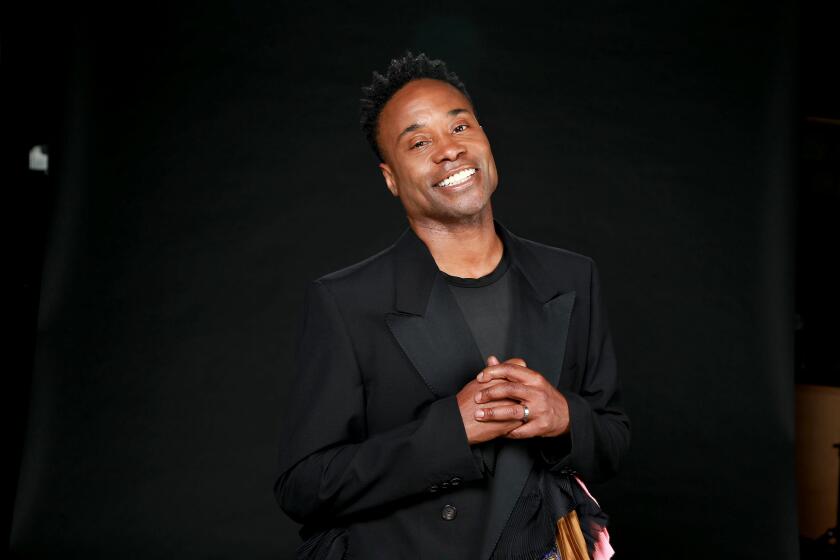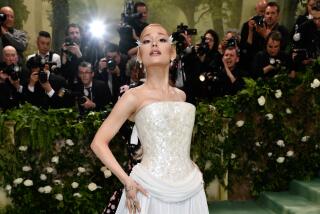Billy Porter reveals he has been HIV-positive for 14 years: ‘There’s no more stigma’

- Share via
“Pose” star Billy Porter revealed Tuesday that he has been HIV-positive for 14 years, saying he’s finally ready to talk about it and is feeling fine.
“This is what HIV-positive looks like now,” he told the Hollywood Reporter in a first-person piece. “I’m going to die from something else before I die from that. My T-cell levels are twice yours because of this medication. I go to the doctor now — as a Black, 51-year-old man, I go to the doctor every three months. That doesn’t happen in my community. We don’t trust doctors.
“But I go to the doctor, and I know what’s going on in my body. I’m the healthiest I’ve been in my entire life. So it’s time to let all that go and tell a different story. There’s no more stigma — let’s be done with that. It’s time. I’ve been living it and being in the shame of it for long enough.”
The Emmy-, Grammy- and Tony-winning star of TV’s “Pose” said playing Pray Tell, his HIV-positive character on the FX show, gave him crucial opportunities in more ways than one.
To him, “Pose” was “an opportunity to work through the shame [of HIV] and where I have gotten to in this moment. And the brilliance of Pray Tell and this opportunity was that I was able to say everything that I wanted to say through a surrogate. My compartmentalizing and disassociation muscles are very, very strong, so I had no idea I was being traumatized or triggered.”
As the groundbreaking FX series’ final season crosses the halfway mark, its co-creator takes us back to the moment that set the tone for the rest.
GLAAD responded to Porter’s revelation in a statement from DaShawn Usher, the organization’s associate director for communities of color.
“The tremendous levels of stigma facing people living with HIV today can only be broken by icons like Billy Porter showing the world that HIV is not at all a barrier to a healthy and successful life,” Usher said before discussing advances in medications, prevention and other treatment that allow HIV-positive people to live long, healthy lives without transmitting the virus. He called those leaps in care and prevention “largely invisible” in the news and entertainment industries.
“When the groundbreaking show ‘Pose’ goes off air in a few weeks, there will be zero television characters living with HIV,” Usher continued. “That is truly unacceptable when 1.2 million Americans and about 38 million people globally are living with HIV. Billy’s powerful interview needs to be a wake-up call for media and the general public that it’s time to end the stigma that people living with HIV face and to educate each other about HIV prevention and treatment.”
2007 was a rough year for Porter, in what he called his “Valley Period, on the precipice of obscurity.” In a video accompanying the THR story, he describes how, in February of that year, he was diagnosed with Type II diabetes; in March, he signed bankruptcy papers; “and by June, I was HIV-positive.”
He told THR, “Shame is a silencer. Shame is destructive. And I was silenced about it for a good 14 years.”
Porter said one of the most powerful silencers was shame “connected to my relationship with my mother and my ex-relationship with the church. My mother had been through so much already, so much persecution by her religious community because of my queerness, that I just didn’t want her to have to live through their ‘I told you sos.’ I didn’t want to put her through that. I was embarrassed. I was ashamed. I was the statistic that everybody said I would be.”
Billy Porter has long been an artist at the forefront of change. His Emmy nomination helps him shine the spotlight on issues.
He described his childhood as “fraught with a lot of religious shaming, growing up in the Pentecostal church ... I was told I would never be blessed and told AIDS was God’s punishment for gays.”
Born in 1969, the Pittsburgh native graduated from Carnegie Mellon University with a bachelor’s in drama and won $100,000 as a contestant on “Star Search” (appearing in the same program as Britney Spears). He racked up a number of Broadway credits and released two of his four albums before originating the role that launched him to stardom: Lola in the 2013 Broadway musical version of “Kinky Boots.” Among the many laurels the role earned him were the Tony for leading actor in a musical and the Grammy for best musical theater album. In 2019, he won an Emmy for his lead performance in “Pose.”
Porter said he had been in therapy for decades, but “in the last year, I started real trauma therapy to begin the process of healing. I started peeling back all these layers: having been sent to a psychologist at age 5 because I came out of the womb a big old queen; being sexually abused by my stepfather from the time I was 7 to the time I was 12; coming out at 16 in the middle of the AIDS crisis.”
According to a 2020 study by GLAAD and Gilead Sciences as summarized by GLAAD: “[S]ix in 10 Americans wrongfully believe that ‘it is important to be careful around people living with HIV to avoid catching it.’ Nearly 90% of American adults agreed ‘there is stigma around HIV’ and ‘people are quick to judge those with HIV.’”
Among the celebrities who have gone public with their HIV-positive diagnoses and continue to prove it’s not the death sentence it once was are Jonathan Van Ness of “Queer Eye,” Olympic gold medalist Greg Louganis (who was diagnosed 34 years ago), Charlie Sheen (who has gone from paying more than $10 million to keep his diagnosis a secret to being a condom spokesman and safe-sex advocate) and Lakers legend Magic Johnson (diagnosed back in 1991).
Porter described telling his mother of his diagnosis, the surprising healing effect of quarantine and more in the THR interview.
“I’m sure this is going to be the first thing everybody says, ‘HIV-positive blah, blah, blah.’ OK,” he told the trade paper. “Whatever. It’s not the only thing I am. I’m so much more than that diagnosis. And if you don’t want to work with me because of my status, you’re not worthy of me.”
More to Read
The complete guide to home viewing
Get Screen Gab for everything about the TV shows and streaming movies everyone’s talking about.
You may occasionally receive promotional content from the Los Angeles Times.








